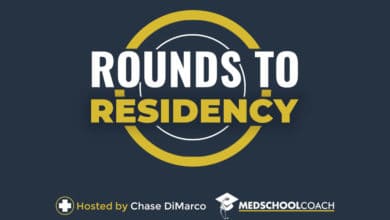Chase DiMarco talks to Dr. Tonya Caylor, a family physician with over 20 years of experience and 12+ years in academics. She is also a certified professional coach working with family medicine residency programs and individual residents. They discuss time management techniques in medicine, embracing feedback during training, and the benefits of gratitude in healthcare.
- [00:54] The Biggest Challenges Facing Residents in Family Medicine
- [02:01] The Joy in Family Medicine
- [03:47] Family Medicine Residents in Alaska
- [05:30] Benefits of Embracing Feedback
- [07:01] The Feedback Sandwich
- [08:25] Key Time Management Techniques in Medicine
- [11:42] How to Develop a Gratitude Practice
- [16:14] Understanding the Thoughts, Feelings, Actions Cycle
The Joy in Family Medicine
Ever heard of the term ‘why didn’t we learn this in medical school?’ You’ve probably even used it several times too. Considering the vast amount of content a medical student will need to consume, the medical curriculum does not cover topics outside patient care. Thus, topics like self-care and time management are things medics are forced to learn on their own. The good news is that more and more coaching services are sprouting all over the country, trying to bridge the soft skills gap in medicine. So, what is coaching? At its core, coaching is a partnership between a coach and a client in which creative processes are implemented to help clients reach their maximum potential.
Embracing Feedback in Medical Training
Feedback is an essential component in every medical student’s understanding of their strong and weak points during training. In a perfect world, it is expected that supervisors dish out feedback to trainees, and trainees carve out time to seek feedback from their supervisors. But the thing is, the perfect world does not exist, and patient care can sometimes take up more time that leaves almost no time for giving and receiving feedback. Unfortunately, most students don’t know how to receive feedback, and the ones that do, only see it as a failure. Medical students are trained to be A players; thus, when particular objectives are not met, everything else is irrelevant. According to Dr. Tonya, students need to adopt a mindset where they embrace feedback, both positive and negative. This, in turn, creates the willingness to improve while focusing on our strong suits.
Time Management in Medicine
As a doctor, it’s expected that your days will be long, which leaves little to no time for self-care. Regrettably, most doctors believe there is nothing they can do about this situation. Dr. Tonya thinks this doesn’t have to be the case. Simple techniques such as fixing paperwork right after a patient leaves can half the amount of time you spend at the office after hours. Most doctors prefer to scroll through social media in between patient meetings instead of focusing on patient paperwork. While there is no harm in scrolling through Facebook once in a while, the best way to save time for other things outside medicine is by maximizing those tiny gaps between patients. Nonetheless, it is essential to note that no single time-management strategy works for everyone. However, physicians who are intentional about their time management habits often end up happier and more satisfied with their work.
The Gratitude Practice in Medicine
Gratitude is the grateful appreciation for what a person receives, tangible or otherwise. Interestingly, recent psychology research strongly links gratitude with greater happiness and satisfaction. It helps people embrace positive emotions, relish good experiences, and build strong relationships. With the stress associated with residency, Dr. Tonya believes that the best way medics can live a more fulfilling life is by embracing the gratitude practice. She believes that writing just three positive things directly connected to your work can decrease burnout, depression and increase happiness levels.
Check out Dr. Tonya’s website and connect with her via LinkedIn
Sign up for a Free Coaching session with Chase DiMarco, sponsored by Prospective Doctor! You can also join the Med Mnemonist Mastermind FB Group today and learn more about study methods, memory techniques, and MORE! Do check out Read This Before Medical School. Like our FreeMedEd Facebook page and find our Medical Micro Course, Blog posts, and Podcasts at FreeMedEd.org! Feel free to Email any Questions or Comments.
